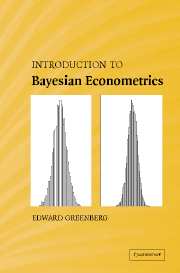Crossref Citations
This Book has been
cited by the following publications. This list is generated based on data provided by Crossref.
Bernhardt, Dan
Xiao, Zhijie
and
Wan, Chi
2012.
The Pretty Good Analyst.
SSRN Electronic Journal,
Jeliazkov, Ivan
and
Rahman, Mohammad Arshad
2013.
Mathematical Modeling with Multidisciplinary Applications.
p.
123.
Pang, Xun
2014.
Bayesian Inference in the Social Sciences.
p.
35.
Kim, Gilwhan
Lin, Winston T.
and
Simpson, N.C.
2015.
Evaluating the performance of US manufacturing and service operations in the presence of IT: a Bayesian stochastic production frontier approach.
International Journal of Production Research,
Vol. 53,
Issue. 18,
p.
5500.
BERNHARDT, DAN
WAN, CHI
and
XIAO, ZHIJIE
2016.
The Reluctant Analyst.
Journal of Accounting Research,
Vol. 54,
Issue. 4,
p.
987.
Woźniak, Tomasz
2016.
Bayesian Vector Autoregressions.
Australian Economic Review,
Vol. 49,
Issue. 3,
p.
365.
Saxena, Neeraj
Wang, Ruiyang
Dixit, Vinayak V.
and
Waller, S. Travis
2020.
Frequentist and Bayesian Approaches for Understanding Route Choice of Drivers under Stop-and-Go Traffic.
Transportation Research Record: Journal of the Transportation Research Board,
Vol. 2674,
Issue. 9,
p.
371.
Mendonça, Mário Jorge
Loureiro, Paulo R. A.
Nascimento, Antônio
and
Ellery, Roberto
2021.
Assessment of the effect of broadband expansion on the economy reviewed.
Review of Development Economics,
Vol. 25,
Issue. 4,
p.
2414.
Ablay, Mulla Veli
and
Doğan, Ahmet
2024.
The Role of R&D Expenditures, Information and Communication Technology Products Exports and High-Technology Products Exports on Turkey’s Technological Development.
İktisadi İdari ve Siyasal Araştırmalar Dergisi,
Vol. 9,
Issue. 24,
p.
428.





